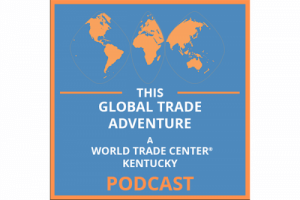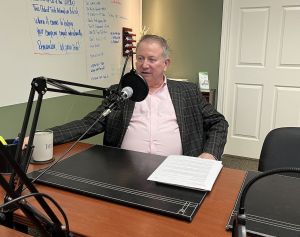Exploring the Louisville Riverport's Foreign Trade Zone #29
April 8, 2024
Episode 11: Today, Dr. Omar Ayyash, President and CEO of the World Trade Center Kentucky interviews Miguel A. Zamora II. He’s the Vice President of the Louisville Riverport Authority. The discussion will focus on how the Louisville Riverport’s Foreign Trade Zone #29 can significantly lower or eliminate cost, reduce paperwork and streamline Customs operations.

Meet Miguel Zamora
Miguel and Omar have known each other for many years. They first met while Miguel was leading the Derby Industry’s Distribution Center at General Electric’s Appliance Park. This is where he became involved in imports, exports and the foreign trade zone. He has a background in supply chain management and manufacturing. That experience eventually lead to an opportunity to work for the Louisville Riverport Authority.
The Louisville Riverport Authority has companies located on its premises. They take advantage of moving goods via barges and rail infrastructure. Interestingly, the Louisville Riverport Authority is also the Grantee for Foreign Trade Zone #29.

What Does the Riverport Provide?
Miguel explains the Foreign Trade Zone was established here in 1977. The Louisville Riverport consists of approximately 2,000 acres. The airport also has a static foreign trade zone designation. UPS and others take advantage of this special opportunity.
The Louisville Riverport Authority can also help companies by sponsoring foreign trade zones in other areas of Kentucky. Toyota in Georgetown has a foreign trade zone (FTZ). The AESC battery manufacturing facility in Warren County has a FTZ designation. The BlueOvalSK Battery Park in Glendale (Hardin County) is also a designated FTZ. There are other sites in Henderson, Berea and others.
If your company imports goods for use in the manufacturing of your product, it may be able to leverage the advantages of a foreign trade zone. It’s extremely helpful if you later export your products. The goods that you export out of a zone avoid being charged a duty. This can become a significant cost savings.
Examples of Financial via a Foreign Trade Zone
Omar asks Miguel to discuss the various savings, beyond just the duty aspects. Lexmark is a subzone FTZ. They routinely import inputs used in their manufacturing process and later export many of the finished products.
The inputs are imported in to their subzone. Those items are not subject to duty, while they’re sitting there. The duty payments are basically deferred, which can have a positive impact on cash flow. When the ink cartridges produced by Lexmark leave the FTZ, they don’t have to duty, at all. It presents a huge savings to the company.
In the example Toyota, because automobiles do qualify for duty, they still realize the benefit of a reduced rate of duty because of the FTZ subzone. Interestingly the duty on the car is actually less than the duty that which would be applied to the individual components being imported. Again, this represents a significant savings.
Omar notes that Kentucky exported approximately $40 billion in 2023. Aerospace and automotive are the number one and number two leading exports, respectively. Being able to defer the duty on many of the components that go into the manufacturing process results in a strong advantage for companies located in the Commonwealth and are taking advantage of the FTZ and subzones.
Kentucky boasts the geographic advantage of being a 7-hour drive from 2/3rds of the US population. We have the ability to function as a hub for many companies in the region.
The UPS Worldport Hub, located in Louisville, enables companies to ship cargo virtually anywhere in the world. Our rail infrastructure provides direct rail connections to the east coast, west coast and other regions.
This system of transportation is a distinct advantage for any company shipping throughout North America and beyond.
Miguel notes that of the $40 billion in Kentucky exports, roughly $5 billion involved our foreign trade zones. In fact, he’s proud of the fact that Kentucky ranks among the top 10-20 in key metrics among all of the US foreign trade zones. Louisville is competing well against Houston, El Paso, Los Angeles, the Inland Empire, Chicago and other FTZs located in Georgia, the Carolinas and New York.
The “#29” notes that we were the 29th FTZ established in the US.
We have a very well-developed ecosystem for international trade. Omar points out this includes our universities teaching about supply chain and international commerce. The World Trade Center Kentucky has Board members who are experts in foreign trade zones. Miguel is directly involved in the National Association of Foreign Trade Zones. He’s a member of its Board of Directors. He specifically focuses his efforts in the formation area and the advocacy efforts to assist operators in taking full advantage of the duty deferments and related issues. This includes maintaining effective working relationships with local Customs and Border Protection officials, as well as at the headquarters level.
Miguel goes onto discuss how being active on a local/statewide level is also a goal of the leadership of the foreign trade zones. They are working to simplify the process of getting a subzone designation or an actual zone. In Kentucky, the Louisville Riverport Authority has a 25-county service area. They can apply for subzones on behalf of companies operating within this service area. There is active outreach to make sure the local economic development teams and county executives fully understand and appreciate the benefits of the program and how they can leverage this important “tool” to grow and expand businesses.
Locally, at the Riverport in southwest Jefferson County, is referred to as the Jefferson Riverport International Development. The available space is almost completely utilized, meaning available area has been sold, built and is occupied. There’s still a 25-acre parcel that’s being targeted for the development of a multimodal operation. There are an additional 17 acres that could potentially be developed. Currently there over 140 companies, employing between 9,000-15,000 people operating onsite.
It’s important to note that subzone applications are still available throughout the 25-county service area discussed earlier. In addition, Miguel comments that other locations outside of this area may be eligible. The program has shown growth and is targeting important levels of continued growth as we approach the 50th anniversary, 3 years from now.
Administrative Savings via the Foreign Trade Zone
Any company will recognize there is a cost to administrative activities, including documentation and processing paperwork. Miguel explains how companies are required to pay a Customs brokerage fee for each Bill of Lading they receive for imported inputs. They also pay Customs a merchandise processing fee, which is a percentage of the value of the goods. The latter fee is capped at approximately $500/shipment.
Now, imagine you have 25 Bills each will a value of $100 in merchandise processing fees, that’s $2,500. The FTZ can work to get a weekly entry. This enables the company to combine the 25 Bills in to a single entry. This reduces it to 1 Customs brokerage fee and the merchandise processing fee is capped at $500 for the transaction. If you have numerous transactions over an extended period of time, the saving can quickly add up. Again, this is a substantial financial benefit to companies who are working with the Louisville Riverport Authority and the foreign trade zones.
Where Do You Begin?
Simply put, start by contacting the World Trade Center Kentucky. There are tremendous training programs, advisory service options and guidance available to help you to navigate this global trade adventure.
Miguel points out that there’s another advantage to working with the Riverport. This relates to the cost of setting up a foreign trade zone or subzone. The application process is relatively simple for the Foreign Trade Zone #29. They work with companies to complete the application and then will submit it to the Foreign Trade Zone Board for review and consideration.
Once the designation is granted, the operator (i.e. the company seeking a designation) will need to work with Customs to activate the site. Operational security of the site will be required. While this may require some investment, that security can (and often does) yield ancillary financial benefits to the business.
At the end of the day, the Louisville Riverport Authority’s Foreign Trade Zone #29 is here to help Kentucky companies to improve their existing business or bring new business to Kentucky.
To Contact Miguel:
Phone: (502) 993-7678
Website: http://www.louisvilleriverport.com/
Upcoming WTCKY EVENTS:
- 06/26/24 – Global Executive Forum – Navigate the Future of Supply Chain
- 10/12/24 – Global Trade Mission 2024 – Dubai, UAE
The next episode of our podcast will launch on 05/13/24. Thank you for listening. Be sure to follow This Global Trade Adventure on your favorite podcast platform, or at www.WTCKY.com/podcast.
We hope you enjoyed Episode 11. Our schedule is to publish a new episode on the 2nd Monday of each month.
Please consider sharing this with your colleagues. Until next time, thank you for listening and welcome to This Global Trade Adventure.
